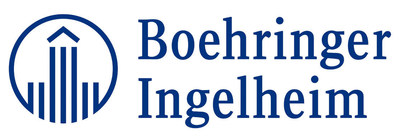Boehringer Ingelheim today announced updated, interim analysis results from the GioTag study, showing that initiating treatment with afatinib followed by osimertinib provided an overall survival (OS) of almost four years (45.7 months) in patients with Del19-positive tumors
|
RIDGEFIELD, Conn., Aug. 5, 2019 /PRNewswire/ -- Boehringer Ingelheim Pharmaceuticals, Inc. today announced updated, interim analysis results from the GioTag study, showing that initiating treatment with afatinib followed by osimertinib provided an overall survival (OS) of almost four years (45.7 months) in patients with Del19-positive tumors. GioTag is a real-world retrospective, observational and unblinded study which examined the impact of treatment with Gilotrif® (afatinib) followed by osimertinib in Del19/L858R epidermal growth factor receptor mutation-positive (EGFR M+) non-small cell lung cancer (NSCLC) patients with acquired T790M mutations, the most common mechanism of resistance to first- and second-generation EGFR tyrosine kinase inhibitors (TKIs).
"It's important to consider sequencing of therapies to provide patients with as many future treatment options given that many of them with this type of lung cancer eventually acquire resistance to EGFR TKIs," said Balazs Halmos, M.D., Chief of Thoracic/Head and Neck Oncology at Montefiore Medical Center. The GioTag study previously provided only 2 years and 2.5 years OS rates. Now, an interim analysis assessed updated data from a sub-set of patients (94/126) with available electronic health records (all from the U.S). The use of electronic data, which facilitated rapid analysis, represented the first step of a two-stage process. After a median follow-up of 30.3 months, median overall survival was almost three and a half years (41.3 months) in patients with acquired EGFR T790M-positive NSCLC treated in a real-world clinical setting, and the updated two-year OS rate was 80%. OS is particularly promising in patients with Del19-positive tumors at the onset of afatinib treatment. In these patients, median OS was 45.7 months and the two-year OS rate was 82%. Updated median time on treatment for sequential afatinib and osimertinib was 28.1 months overall, and 30.6 months in patients with Del19-positive tumors. Median time on osimertinib treatment following treatment with afatinib was 15.6 months and 16.4 month for Del19 mutations. "Real-world data continue to inform the use and sequencing of cancer treatments," said Dr. Halmos. "The updated GioTag study findings add to a growing body of evidence that afatinib followed by osimertinib is a viable treatment sequence and associated with prolonged overall survival for patients." Dr. Victoria Zazulina, Corporate Vice President and Global Head of Oncology, Medicine, at Boehringer Ingelheim, said, "The continued clinical development of new EGFR TKIs provides additional treatment options for patients with EGFR M+ NSCLC, and raises questions about their optimal sequence. Given that, as yet, no established targeted treatment options are available following failure of osimertinib, there is an argument for reserving osimertinib for second-line use after second-generation EGFR TKIs. Real-world data from the GioTag study supports the argument for sequential use of afatinib and osimertinib for patients with EGFR M+ NSCLC who are Del19-positive." The observational GioTag study provides data on a broad, real-world population of patients. 15.3% had a poor performance status of ECOG PS of ≥2 and 10.3% had stable brain metastases, ordinarily criteria which would preclude these patients from participation in clinical trials. This interim analysis is the first of a two-step process. A final analysis is planned for early 2020 which will include updated data from Asian and European countries. What is Gilotrif? Gilotrif is a prescription medicine that is used to treat people with non-small cell lung cancer (NSCLC) that:
It is not known if Gilotrif is safe and effective in treating people with lung cancer that has resistant abnormal EGFR genes. or is used to treat people with squamous cell lung cancer that:
It is not known if Gilotrif is safe and effective in children. IMPORTANT SAFETY INFORMATION ABOUT GILOTRIF Before you take Gilotrif, tell your doctor if you:
Tell your doctor about all the medicines you take, including prescription and over-the-counter medicines, vitamins, and herbal supplements. Gilotrif may affect the way other medicines work, and other medicines may affect the way Gilotrif works. What to avoid while taking Gilotrif Gilotrif may cause serious side effects, including:
Your doctor will do blood tests to check your liver function during your treatment with Gilotrif.
The most common side effects of Gilotrif include diarrhea, rash, mouth sores, nail inflammation, dry skin, acne, decreased appetite, nausea, vomiting, itching. Gilotrif may cause decreased fertility in females and males. Talk to your doctor if you have concerns about your fertility. Tell your doctor if you have any side effect that bothers you or that does not go away. These are not all of the possible side effects of Gilotrif. For more information, ask your doctor or pharmacist. Call your doctor for medical advice about side effects. You are encouraged to report negative side effects of prescription drugs to the FDA. Visit www.fda.gov/medwatch or call 1-800-FDA-1088. Please see Prescribing Information and Patient Information. About Boehringer Ingelheim in Oncology About Boehringer Ingelheim Pharmaceuticals, Inc. Boehringer Ingelheim is one of the world's top 20 pharmaceutical companies. Headquartered in Ingelheim, Germany, the company operates globally with approximately 50,000 employees. Since its founding in 1885, the company has remained family-owned, and today our goal is to improve the lives of humans and animals through its three business areas: human pharmaceuticals, animal health and biopharmaceutical contract manufacturing. Boehringer Ingelheim concentrates on developing innovative therapies that can improve and extend patients' lives. As a research-driven pharmaceutical company, it plans in generations for long-term success. Its research efforts are focused on diseases with high, unmet medical need. In animal health, the company stands for advanced prevention. In 2018, Boehringer Ingelheim achieved net sales of around $20.7 billion (17.5 billion euros). R&D expenditure of almost $3.7 billion (3.2 billion euros) corresponded to 18.1 per cent of net sales. Boehringer Ingelheim is committed to improving lives and strengthening our communities. Please visit www.boehringer-ingelheim.us/csr to learn more about Corporate Social Responsibility initiatives.
SOURCE Boehringer Ingelheim Pharmaceuticals |





